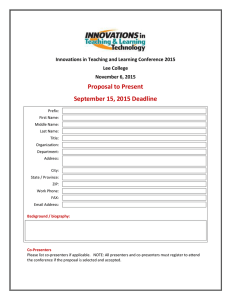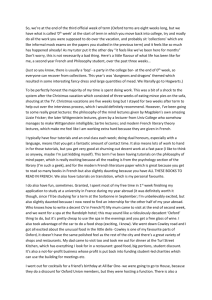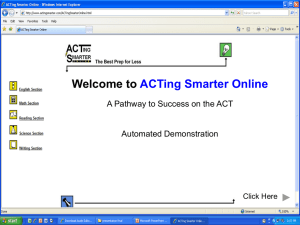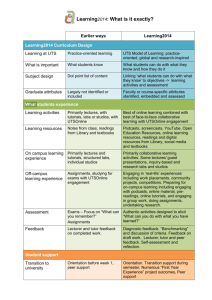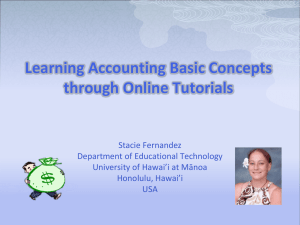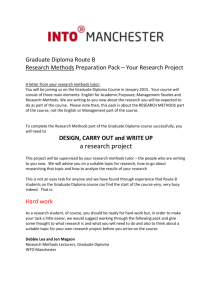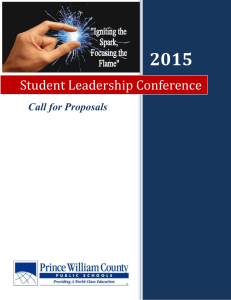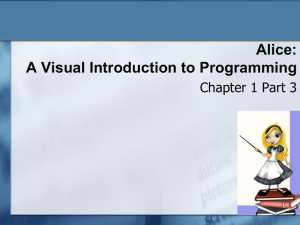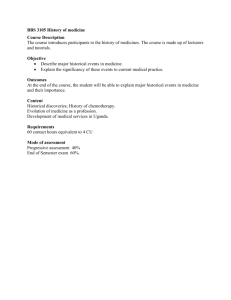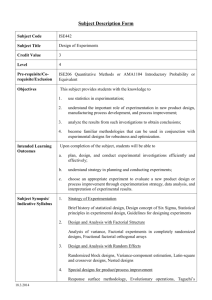L&T Conference Abstracts Afternoon Session
advertisement
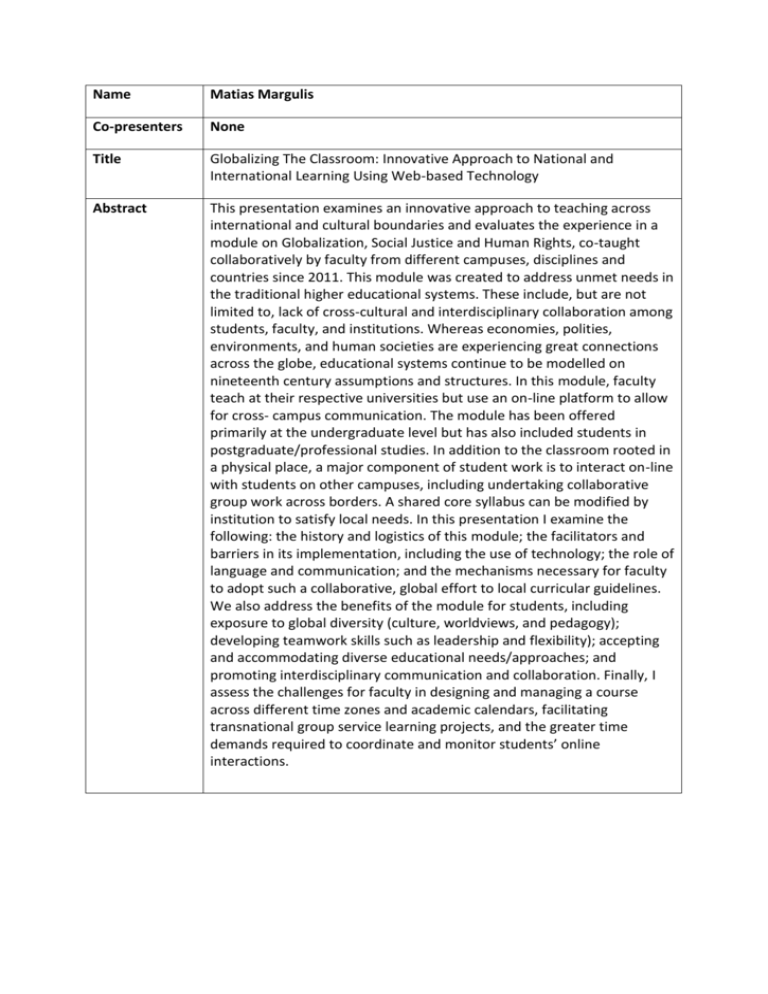
Name Matias Margulis Co-presenters None Title Globalizing The Classroom: Innovative Approach to National and International Learning Using Web-based Technology Abstract This presentation examines an innovative approach to teaching across international and cultural boundaries and evaluates the experience in a module on Globalization, Social Justice and Human Rights, co-taught collaboratively by faculty from different campuses, disciplines and countries since 2011. This module was created to address unmet needs in the traditional higher educational systems. These include, but are not limited to, lack of cross-cultural and interdisciplinary collaboration among students, faculty, and institutions. Whereas economies, polities, environments, and human societies are experiencing great connections across the globe, educational systems continue to be modelled on nineteenth century assumptions and structures. In this module, faculty teach at their respective universities but use an on-line platform to allow for cross- campus communication. The module has been offered primarily at the undergraduate level but has also included students in postgraduate/professional studies. In addition to the classroom rooted in a physical place, a major component of student work is to interact on-line with students on other campuses, including undertaking collaborative group work across borders. A shared core syllabus can be modified by institution to satisfy local needs. In this presentation I examine the following: the history and logistics of this module; the facilitators and barriers in its implementation, including the use of technology; the role of language and communication; and the mechanisms necessary for faculty to adopt such a collaborative, global effort to local curricular guidelines. We also address the benefits of the module for students, including exposure to global diversity (culture, worldviews, and pedagogy); developing teamwork skills such as leadership and flexibility); accepting and accommodating diverse educational needs/approaches; and promoting interdisciplinary communication and collaboration. Finally, I assess the challenges for faculty in designing and managing a course across different time zones and academic calendars, facilitating transnational group service learning projects, and the greater time demands required to coordinate and monitor students’ online interactions. Author Dr Vikki McCall Co-presenters Ian McIntosh Title Utilising online peer-review as a vehicle for student learning and assessment Abstract The Housing Studies programme at the University of Stirling is innovative in its blended learning approach that utilises both face-toface and online learning. The programme includes a mixture of assessment practices to challenge students and equip them with a variety of skills. One of the modules on Organisational Behavior has developed an assessment based on student online peer-review through PeerMark. This paper explores the opportunities and challenges of using peerassessment as a vehicle for learning. Reported student benefits have included an increase in critical engagement skills and the overall improvement of writing techniques. Furthermore, in a course that is based mainly online, students felt they were increasingly connected to their groups through the peer-assessment process. However, students initially found peer-assessment intimidating and utilizing this method is resource intensive on the teaching side and requires increased preparation time for students. The challenges involved with online peer-assessment were overcome by clear guidance on the peer assessment process and the use of a ‘peerbuddy’ system. Students had three opportunities to practice writing peer assessment before they submitted and marked others work officially. Those who participated in this process reported positive feelings and were generally happy with the cyclical feedback process. This process ultimately prepared them with the skills to give constructive feedback in the work place. Author Isaac Tabner & Sarah Smith Co-presenters Isaac Tabner & Sarah Smith Title Participation, Group Work and Assessment: Experience and from Accounting and Finance Abstract Five percent of the overall grades of selected finance modules co-ordinated by the authors are determined by student participation. Participation is measured as engagement in group presentation of tutorial exercises; attendance and contribution to tutorials and lecture attendance. Students are given written guidance on managing group work and advised upon how conflicts within groups may be resolved. Students are reminded of the benefits of participation and its contribution to assessment throughout the study process but participation levels of some students remain a concern. A regression model of student participation score on final exam results indicated a statistically significant and positive relationship between the two variables after controlling for performance in the module class test. The presentation reflects upon the authors’ experience of encouraging and assessing participation, highlights key findings from the literature and invites feedback for future work. Author Dr. Carol Marshall Co-presenters Professor George Burt Title Providing the Fuel for a Flying Start into Taught Postgraduate Study and Career Progression. Abstract The Flying Start Leadership Programme is a non-credit bearing induction programme delivered to all taught post-graduate students in the University of Stirling Management School. Introduced in 2014, this innovative programme prepares students for the academic year ahead as well as their transition into employment. On arrival students spent their first few days on campus with students from their own disciplines as well as students from other disciplines within the School in a friendly, informal teaching environment. The students engaged in a variety of activities designed to: increase their self-awareness; help them to understand the power of effective communication; appreciate the input of individuals within a team and how successful an effective team can be; encourage them to celebrate cultural differences and to be culturally intelligent; improve their critical thinking and problem solving skills and to facilitate engagement with business leaders. In addition, the Programme enabled students to meet with staff and prepare for their chosen course. The pedagogy of the Programme relies on mixed delivery and includes modelling, co-operative learning, experiential learning and relating theory and practice. Early survey results indicate that students highly rated the Flying Start Leadership Programme and enjoyed the experience. Follow-up focus groups are planned with students and staff to better understand the outcomes of the Programme and to inform the next Programme scheduled for 2015. Author Terrie Lynn Thompson Co-presenters Cate Watson, Valerie Drew, Anna Wilson, Sarah Doyle Title Opening critical spaces for professional learning: Online pedagogies and assessment Abstract This presentation reports on a new initiative by the MSc Professional Education and Leadership team in the School of Education. Engaging Critically with Professional Practices was developed collaboratively through a University-Local Authority partnership. Delivered online, this masters-level module facilitates development of a networked space in which students and Critical Colleagues (teachers recruited from partner local authorities) work with the University tutors to critically interrogate education policies and practices. Blending learning and work spaces—online and physical—creates valuable opportunities for situated and practice-based learning. The pedagogical philosophies framing this module emphasize collaborative learning and an ethos of professional enquiry to encourage transdisciplinary and cross-authority learning. As Mulcahy (2005) writes, “education becomes an accomplishment of a network rather than an individual” (p. 3). The networked design of this online module offers an array of different spaces for such contributions and conversations. Students are encouraged to actively engage in knowledge generation and mobilization; taking responsibility for the learning of others and the group as a whole. Such expectations are reflected in the assessment activities. Opportunities for formative assessment throughout the module include self and peer assessment as well as feedback from tutors and Critical Colleagues. Student-generated content (i.e., postings, wiki contributions, and digital artefacts) is considered a form of what Knorr Cetina (2001) refers to as epistemic objects. How these public digital knowledge contributions “travel” and lead to ways of knowing is of interest in our assessment strategies. There is, therefore, an emphasis on “learning in the making rather than learning as ready made” with the “fuzzy, pragmatic and messy business of learning” made more visible (Bigum et al., 2014, p. 434). Our presentation will focus on how different technologies were purposefully selected to support pedagogical and assessment strategies and data collected to date which examines impact on the learning experience. Author Edward Moran Co-presenters N/A Title Is It Real Teaching? Post-Graduate Students’ Perceptions and Use of Online Video Tutorials Abstract Use of recorded lectures using “Listen Again” has become an accepted part of the approach to teaching and learning in the modern university. It seems a logical next step in the development of blended delivery to diversify our teaching and learning approach by replacing lectures with specially prepared online tutorials. In theory, such tutorials are not simply recorded lectures, but use a range of media and design strategies to make the input engaging. Among the proposed advantages are the ability to embed quizzes that allow learners to test themselves and repeatability, which allows learners to refer back to relevant input for assessment purposes. This presentation reports a small scale study funded by SELF of post-graduate students’ perceptions of online video tutorials compared to face to face lectures, their use of the videos and the learning strategies they employed while watching them. Data was collected from online tracking of user-interaction, usage statistics collected by Succeed, and semi-structured interviews. Findings suggest that while learners recognise and value the strengths of online delivery of teaching input and interact with the material in purposeful ways, they also recognise and value the social interaction of face to face teaching and learning. The presentation will argue that, in the same way that the DVD has not completely replaced an outing to the cinema, online video tutorials are unlikely to completely replace a strong face to face component in higher education in the near future. It will also discuss the pedagogical implications for both the design of online video tutorials and associated face to face classes.
